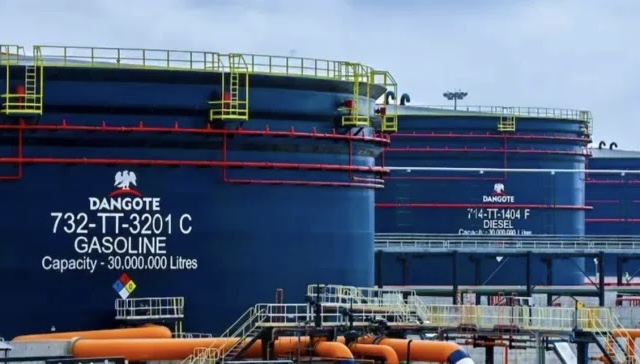KEY POINTS
- Dangote Refinery is saving Nigeria over N10 billion annually by replacing fuel imports with local production.
- Fuel import costs dropped from $2.6 billion in Q1 2024 to $1.2 billion in Q1 2025 as refinery output ramps up.
- The facility is drawing interest from global jet-fuel buyers as it plans to expand capacity to 1.4 million barrels per day.
Nigeria is beginning to feel the economic weight of the Dangote Refinery, with the facility now saving the country more than N10 billion annually in foreign exchange as it replaces imported fuel with locally refined products.
The impact, according to Sunday Esan, Senior General Manager for Corporate Communications at Dangote Industries Limited, extends far beyond the headline numbers, touching everything from energy security to job creation and the stability of the naira.
Esan spoke in Lagos on Thursday during the 2025 Media Week of the Nigeria Union of Journalists, Lagos State Council, where industry players gathered to examine how businesses can survive the tough economic climate and what role the media plays in navigating Nigeria’s fraught energy landscape.
He explained that the refinery had already begun reshaping the country’s long-standing reliance on imported petrol and diesel. “The refinery is more than a national landmark; it is reducing foreign exchange outflows, driving GDP growth, creating jobs, positioning Nigeria as a regional energy hub, and strengthening our national energy supply,” he said.
The Dangote Refinery began operations almost two years ago, and Esan emphasised that its economic contribution has been tangible and measurable.
He pointed to fewer petrol and diesel imports, a more stable naira, thousands of new jobs, and gradual improvements across the energy supply chain. In the first quarter of this year alone, fuel imports dropped by 1.54 percent.
Nigeria, which spent around $2.6 billion on fuel imports in the opening months of 2024, saw that figure fall to $1.2 billion in the same period of 2025.
As Esan put it, “Dangote Refinery has saved Nigeria over N10 billion annually in foreign exchange by replacing imports with local production. It has significantly curtailed oil imports and created measurable economic impact.”
Refinery Expansion Plans and Global Buyers Circle for Jet Fuel
Beyond domestic benefits, Esan said the refinery is fielding rising interest from international buyers. Discussions are ongoing with Saudi Aramco, one of the world’s largest refining companies, and with United States purchasers keen on securing jet fuel from the facility.
The refinery is also reviewing plans to scale up its output from 650,000 barrels per day to 1.4 million barrels per day, a leap that would place it among the largest refining complexes globally.
Esan described the physical size of the facility as one of the clearest illustrations of the investment made by the Dangote Group.
The entire complex, he explained, is about seven times the size of Victoria Island and requires at least five hours to tour by car. “This shows the magnitude of the investment that one man, Alhaji Aliko Dangote, has brought to life,” he said.
To strengthen distribution, Dangote Industries has acquired 4,000 CNG-powered trucks, a move Esan said has created at least 24,000 jobs across the logistics chain.
He also drew attention to the role of the media in shaping public understanding of Nigeria’s evolving energy sector.
He encouraged journalists, especially NUJ members, to undertake informed reporting and to visit the refinery to gain deeper insight into its operations. “When some people are bent on pulling it down, you will understand that this is a national asset we must protect,” he said.



